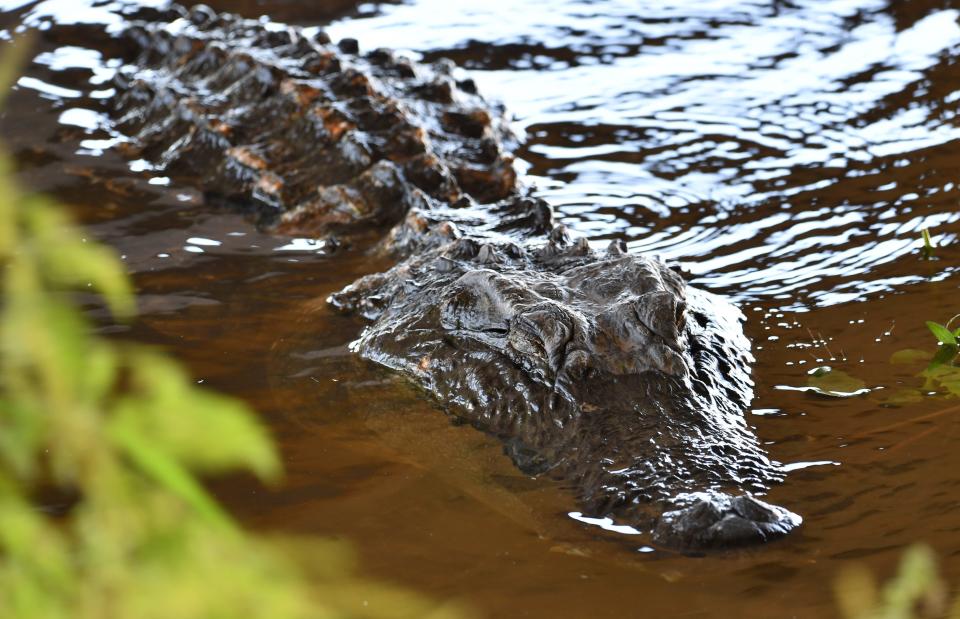It's alligator mating season in Sarasota. Here's where to find and (safely) watch them
It's alligator mating season in Florida, which means we'll be seeing more of our large reptile friends. Here are some tips on alligators and, if you'd like, where to (safely) watch them in Sarasota.
Where can I safely watch alligators?
Never feed an alligator and, if you take photos, do it from a safe distance of at least 30 feet. If you want a closer view, bring a pair of binoculars. Do not attempt to get close, touch it or handle it. Keep an eye on children when they are playing in or around water, and do not allow pets to swim, exercise or drink or near waters that may contain alligators.
9-foot crocodile showed up on a Florida driveway. 'It kept hiding. It took 4 hours' for FWC to safely remove it
Oh, Florida! Who is that gator in the window? Woman snaps late-night doorstep photos of alligator
Where’s the best place to see alligators?
Deep Hole at Myakka River State Park
Located in the Lower Lake at Myakka River State Park, the Deep Hole is a magnet for alligators. The 140-foot sinkhole acts like a fish trap when the water level are low, attracting alligators looking for a meal during the dry season. Make sure to bring plenty of water and wear proper shoes for the hike.
Peace River Tours
For those looking for a more educational experience, Peace River offers swamp buggy, airboat or horseback alligator tours. Guides will give background on wildlife in the area and give the opportunity to snap some photos of gators.
Mote Marine Laboratory and Aquarium
A little squeamish about Florida’s large-toothed friends? Mote offers alligator watching with the comfort of a glass barrier.
When is alligator mating season?

Alligator activity picks up in the spring and summertime, when they typically breed and look for new habitats. It’s also considered to be primetime for environmental conditions with hotter and wetter climate. They like to hang out in the mornings and late afternoon when it isn't too hot.
What should I do if I see an alligator?
Go the other way if you see a gator. They are most dangerous in the water or by the shoreline, but they can move very quickly for short distances on land and can lunge. If you see one when you're in the water, get out as quickly and as quietly as you can, as alligators are attracted to splashing.
There's an alligator in my neighborhood retention pond. Should I be scared?
Check under your car. If you have pets, take them for a walk on the sidewalk and away from the retention pond. Always be aware.
Who do I call if there's a nuisance gator?
If you encounter an alligator that might be a threat to people, pets or property, call the Florida Fish and Wildlife Conservation Commission’s Nuisance Alligator Hotline at 1‐866‐FWC‐GATOR (392‐4286) or visit myfwc.com. Their Statewide Nuisance Alligator Program (SNAP) uses contracted alligator trappers to remove alligators 4 feet in length or greater that are believed to pose a threat.
Crocodile or alligator: what's the difference?
Although both are crocodilians, the easiest way to tell the difference depends on where you spot the reptile, according to SeaWorld in Orlando. Alligators are mostly found in freshwater, while crocodiles prefer salt and brackish water.
Alligators are black, according to Florida Fish and Wildlife Conservation Commission, compared to the grayish-green color of the crocodile. Alligators have a broad, rounded snout while crocodiles have a triangular snout, according to SeaWorld’s website.
This article originally appeared on Sarasota Herald-Tribune: Gator mating season in Florida: Never feed them & what you shouldn't do

